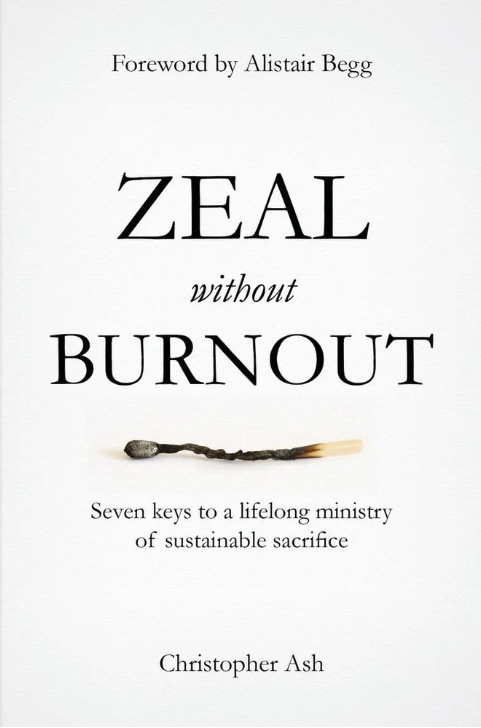
Jason Forbes
Disability Advocate
Zeal without Burnout
Christopher Ash. Wheaton, IL: Crossway, 2016.
Serving our Lord and Saviour is a wonderful privilege and joy. Most of the time, ministry leaders are encouraging others to take up ministry in one form or another. So, it may be strange to hear that some people are overdoing it in their ministry roles, and literally working themselves sick. Yet, the problem is more common than might be expected. This is the issue that Christopher Ash addresses in his short, but helpful book, “Zeal without Burnout”.

In the chapter “What exactly is Burnout?” Dr. Steve Midgley explains that “burnout” is not a medical term, and neither is “mental breakdown”. Nonetheless, they are terms to describe a drop in performance after prolonged excessive stress (my paraphrasing). We need a certain level of stress to motive and energise us. However, when that stress is prolonged, it has the opposite effect.
Symptoms of burnout include sleeplessness, low moods, tears, lethargy, anxiousness, poor judgment, and moral lapses. The problem is the symptoms of burnout aren’t always obvious to the person who’s suffering burnout. Throughout the book, Ash has dispersed stories from other people who have experience burnout. One of those stories comes from a woman named Carrie.
Carrie was employed in a student ministry and typically worked 14-hour days. She never considered this a burden because she enjoyed her work so much. Carrie was also disciplined in taking a day off each week spending time with friends. While Carrie’s only symptom was poor sleep, other symptoms developed including poor eating, high metabolic rate, digestive system problems, heart palpitations, cluster headaches, withdrawal from people, along with concentration and decision-making difficulties. Carrie required three months off work and resigned two months after returning to work.
To avoid burnout, Ash reminds us that we are not God. Unlike God, we need sleep, days off, friends, refreshment (inward renewal). We need to avoid the trap of seeking renown and glory. We need to be mindful that our ministry is worth it, even when things don’t go to plan, and that it is God’s work. Finally, we need to delight in the grace of being in a saving relationship with God, and not in his gifts.
Most of all, we need to remember what Ash and his wife occasionally say to the other – “there is only one Saviour of the world; and it’s not you, and it’s not me.” This is really important to remember when ministering with people who have high needs, such as people with disabilities. We do not have the resources to solve every problem, and even if we had, there would be other things that would be neglected like marriages, families, friends – the very things we need to keep going. So, to have effective ministry and to keep going, we need to consider our own health.
In his opening pages, Ash tells us that sacrifice is not the same as burnout. Inasmuch as Jesus calls his followers to sacrifice themselves (Luke 9:23–24), the call does not include sacrificing those around us in the process – which is what burnout does when we eventually collapse. Ash takes Paul’s language of a “living sacrifice” in Romans 12:1 to mean a “sustainable sacrifice”. This is consistent with the main point of his book, and it is a wise thing to consider for ministry.
However, that is probably not the concern being expressed in Romans. Paul’s concern is that followers of Jesus offer themselves for the services of God rather than the indulgences of the flesh (or sinful nature). When our motivations for ministry are examined, we may find sin such as a yearning for renown, or a distrust in God and his promises. Hence, ministry can actually become an attempt to indulge the flesh. At this point, we may need to reconsider what it means to present ourselves as a living sacrifice and to rest in God’s grace.
Ash’s book on burnout is not a comprehensive treatment of the subject, and neither is it intended to be. This is the strength of the book. As Ash mentions, one of the symptoms of burnout is a decline in the ability to concentrate which makes reading more difficult. However, Ash’s book is an easy read which doesn’t take that much processing and can be read in a few hours. So, if you’re concerned that your showing symptoms of burnout, take some sick leave, find a quiet place, and spend a few hours reading this book as a starter into understanding your own mental health needs, and how you can better serve others. If you not concerned, find a quiet spot and read it anyway. You’ll be better equipped to recognise the symptoms of burnout both in yourself and others and take preventive action.
